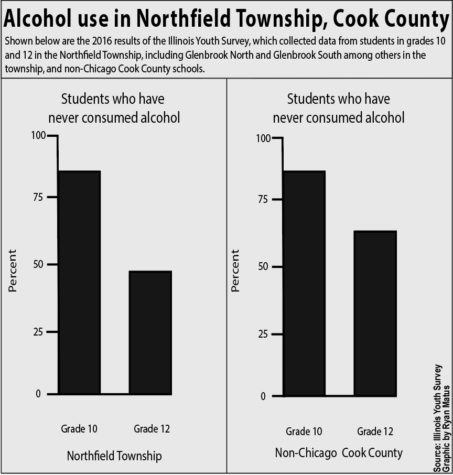Study correlates academics to substance use

While he is thankful for the opportunities available to him as a resident of a wealthy community like Northbrook, junior Charlie Oberman recognizes that this environment and academic success can also have negative effects on the students in the area, such as turning to drugs or alcohol.
“[Some of my high achieving friends] have a ton going on with academics and extracurriculars and want to have some sort of release because of all the pressure,” Oberman said.
According to the National Longitudinal Study of Adolescent Health in the United States, as well as a recent study published in the British Medical Journal, higher academic achievement and intelligence in childhood may have an influence on increased levels of alcohol consumption and drug use. The U.S. study determined intelligence categories based on students’ IQ scores and found a correlation with substance use in young adulthood. The British study categorized academic attainment off of student performance on a national test and found a correlation with substance use in early adolescence.
Peter Barr, postdoctoral fellow in the department of psychology at Virginia Commonwealth University, said in a phone interview that while there are factors associated with academic success that may reduce overtly dangerous behaviors involving drinking, such as being more responsible, elevated academic accomplishment may lead to more regular alcohol consumption.
“There’s a … relationship between education in general and alcohol use,” said Barr. “You can imagine that people with better [academic achievement] may have careers [when they grow older] where going out and drinking and socializing may be more prevalent.”
Attempts to interview professionals from Glenbrook North who deal with alcohol and drug use were unsuccessful.
Although Oberman knows of high-achieving students who use substances such as drugs or alcohol, he said he has not noticed a specific connection between the two.
Barr said there are a variety of factors on top of academic achievement in communities like Northbrook, such as wealth, that put adolescents at a greater risk for both regular alcohol use and binge drinking.
“A lot of [substance use] has to do with access,” said Barr. “Kids from wealthier homes may have easier access to their parents’ liquor cabinet, or they may have more resources to obtain [alcohol or marijuana].”
In a phone interview, Richard J. Rose, professor emeritus in the department of psychological and brain sciences at Indiana University Bloomington, said lower surveillance from parents, mainly due to increased trust, is a large factor in why adolescents and young adults in a community like Northbrook could be at a greater risk for alcohol use.
Despite the illegality of underage drinking, many parents in wealthy neighborhoods may allow their children to drink, Rose said.
“It’s obviously a fact that some parents might look quite benignly on [underage drinking].
“They have the means to do so, and they have the willingness and desire to do so,” Rose said.
According to Oberman, many parents allow for greater access to substances by treating their children as if they are older than they actually are.
“A lot of parents in this area, because of the way this area is where it’s nice and safe, and a lot of people are wealthy, … parents treat kids like adults even when they aren’t adults yet,” Oberman said.
According to Rose, decreased supervision other than just that of parents, such as that from police, can be lower in a wealthy suburb because of an expectation of responsibility, which also has an influence on illegal alcohol and drug usage for students.
Barr said the relationship of both education and privilege with alcohol and marijuana use is complex and unusual.
“[Alcohol use] is one of those weird [scenarios] where you see a flip, where it’s the people from the relatively more privileged background that are more likely to drink more,” Barr said.

